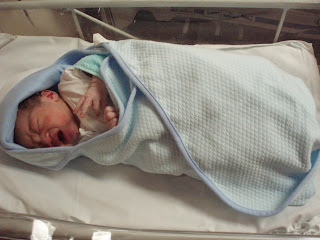If I live in a house of spotless beauty with everthing in its place, but have not love, I am a housekeeper--not a homemaker.
If I have time for waxing, polishing, and decorative achievements, but have not love, my children learn cleanliness--not godliness.
Love leaves the dust in search of a child's laugh. Love smiles at the tiny fingerprints on a newly cleaned window.
Love wipes away the tears before it wipes up the spilled milk. Love picks up the child before it picks up the toys.
Love is present through the trials. Love reprimands, reproves, and is responsive. Love crawls with the baby, walks with the toddler, runs with the child, then stands aside to let the youth walk into adulthood.
Love is the key that opens salvation's message to a child's heart.
Before I became a mother I took glory in my house of perfection. Now I glory in God's perfection of my child. As a mother, there is much I must teach my child, but the greatest of all is love.

































